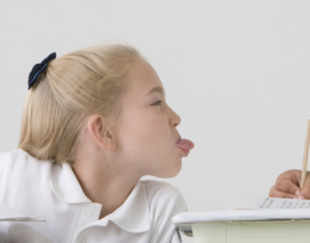
Kids can be really mean. In fact, it's hard sometimes to watch my son and his preschool buddies play. If you linger long enough, inevitably someone ends up being teased (although, yes, it's still pretty innocuous at this age), left out of a game, or bossed around. It's as if these kids are trying on different personalities - testing out being nice, mean, or silly to see how their peers react.
What makes little kids mean, and why are some meaner than others? Is it in their DNA, the media they consume, or their home environment? There's no one answer to this question, but there are a few things we know about what brings out the dark side of little kid behavior.
Testing social dynamics
In the preschool years, kids begin to figure out social structures and learn how to be effective in a group. When I watch little kids at work, it's clear that a lot of the insults, grabbing, and put-downs are part of this experimentation with social dynamics. If I do x, will my friend do y? And (as I shutter to remember from my own playground experiences as a kid) meanness can draw attention and wield power. If a child rises to the top of the pack by intimidating or putting down others, it's a technique that might just stick.
Television
We've all heard that violent screen time makes kids more physically aggressive. But surprisingly, educational TV (which most of our kids watch regularly) seems to make kids mean in a different way. Studies have shown that the more educational television kids watch, the more relationally aggressive (manipulative, insulting, and so forth) they are to their peers. Shows like PBS' Arthur seem innocuous, but the lessons aren't as desirable as we think. Researchers say that children's programming contains a heavy dose of name-calling and put-downs that parents would never condone if it happened in real life. Even though the end of a show might have a nice moral conclusion, if 90 percent of the screen time is rude and hurtful, that will be the take-away.
Listen to the content of your kid's shows to see how they stack up when it comes to relational aggression. How often does a character insult or boss another around? It's hard to find media that doesn't hinge on this type of banter (in fact, researchers have found that most kids shows do), but in our house for example, Sesame Street and The Backyardigans are winners as overwhelmingly positive shows.
The home front
There's no doubt that kids learn a lot about how to treat others from how they are treated at home. Harsh parenting, including verbal and physical aggression, increases the likelihood that a kid will in turn be aggressive (although, for kids who are wired sensitively, this seems to not be the case - they tend to internalize their struggles rather than lash out, so they may not be the ones who bully on the playground).
Studies show that high marital conflict can spark behavioral problems, too, particularly when parents fighting turns nasty. A child who is mean or aggressive at school could be acting out the interactions he sees at home, or working through his feelings about them. As parents, we don't have to worry about every little spousal tiff, though, since constructive fighting (in which parents vet feelings, listen to each other, and come to solutions) can actually boost a child's level of social skill.
Temperament
Yes, parenting is important, but kids who are mean may be wired differently as well. For example, children who show impulsive-hyperactive behavior in early childhood are more likely to be physically aggressive in middle childhood. The ability to control impulses is a work in progress through adolescence (and into adulthood), but some kids are innately better at this than others, and these kids are less likely to act out.
Having a good "theory of mind" (the ability to see things from another person's perspective) also helps kids play nicely and respect each other's feelings. You might remember this from last week's article on popularity - it's a fundamental skill that is a big help to kids socially. If a child is empathetic and appreciates that he has an impact on his friend, he's less likely to be mean.
For example, earlier this year, in a study in the Journal of Child Psychology & Psychiatry, researchers found that kids who had poor theory of mind skills at age five were more likely to both bully, and be bullied, at age 12. Parents can help here by talking to kids about their own feelings and how they affect other people (for example, by recognizing the meaning of facial expressions), starting in toddlerhood. Yes, some of our little ones are naturally wired empathetically, but this ability can be nurtured and taught, too.
Whatever the reason, each of our kids will encounter (or at times, be) the meanies of the world. What can we do, as parents? It's so hard (for me, it's bordering on impossible) to sit back and resist the impulse to jump in and save our kids from every negative encounter. Of course, we can't. But if we're aware of the roots of meanness and understand where it comes from, maybe we can make sense of it in our own minds, treat it as a growing experience, and ultimately help our budding little beings learn how to be kind and compassionate people.
No comments:
Post a Comment